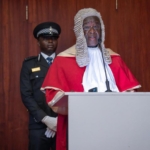
Newly sworn-in Chief Justice, Justice Paul Baffoe-Bonnie, has assured Ghanaians that he will defend the rule of law and safeguard the independence of the judiciary and the constitution as he begins his tenure.
Speaking during his swearing-in ceremony at the Presidency on Monday, November 17, Justice Baffoe-Bonnie said he was taking on the role with a firm commitment to constitutional principles.
“Mr President, in accepting this office, I give my solemn word that I will uphold the rule of law, respect the separation of powers, and protect the Constitution.”
He went on to say the importance of judicial independence, adding, “I will respect the independence of every judge and ensure that the judiciary remains free from improper influence. I will also insist on accountability because independence without responsibility risks entitlement and erosion of public trust.”
Justice Baffoe-Bonnie also highlighted the standards he expects from judges and court staff. He explained that “judges, court officers, and staff will be encouraged and supported to act ethically, to treat all who come to court with fairness, and to understand that the title ‘judge’ is not a privilege but a public service.”
He said the judiciary must always remember the weight carried by those who seek justice.
“Every litigant who enters a courtroom brings not only a case but also hope that justice will be done. I accept the responsibility of preserving that hope,” he said.
Calling for wider support, the Chief Justice urged the legal community and the public to work alongside the courts.
“I urge all stakeholders – lawyers, litigants, civil society, and the public – to join us in forging a judiciary worthy of the confidence of the Ghanaian people,” he stated.
Justice Baffoe-Bonnie also addressed long-standing concerns over legal education, describing reform as unavoidable.
“We also cannot ignore the call for reform in legal education. The future of the bar is the future of the bench. We must move from exclusion to inclusion, from rote learning to critical thinking, and from credentialism to competence.”
He said the judiciary would collaborate with key institutions to improve training for future lawyers.
“Working with the General Legal Council, the Ghana School of Law, and our law faculties, we shall pursue a model that ensures opportunity without compromising quality. Our goal is not merely to produce more lawyers, but better lawyers who are disciplined, ethical, and devoted to the cause of justice.”